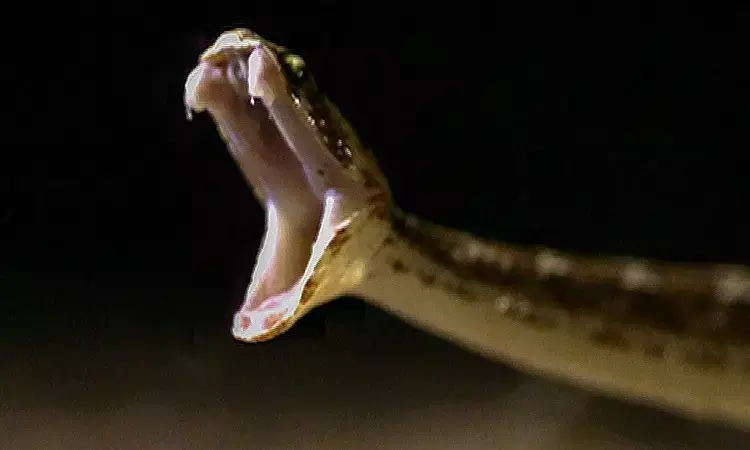- Home
- Medical news & Guidelines
- Anesthesiology
- Cardiology and CTVS
- Critical Care
- Dentistry
- Dermatology
- Diabetes and Endocrinology
- ENT
- Gastroenterology
- Medicine
- Nephrology
- Neurology
- Obstretics-Gynaecology
- Oncology
- Ophthalmology
- Orthopaedics
- Pediatrics-Neonatology
- Psychiatry
- Pulmonology
- Radiology
- Surgery
- Urology
- Laboratory Medicine
- Diet
- Nursing
- Paramedical
- Physiotherapy
- Health news
- Fact Check
- Bone Health Fact Check
- Brain Health Fact Check
- Cancer Related Fact Check
- Child Care Fact Check
- Dental and oral health fact check
- Diabetes and metabolic health fact check
- Diet and Nutrition Fact Check
- Eye and ENT Care Fact Check
- Fitness fact check
- Gut health fact check
- Heart health fact check
- Kidney health fact check
- Medical education fact check
- Men's health fact check
- Respiratory fact check
- Skin and hair care fact check
- Vaccine and Immunization fact check
- Women's health fact check
- AYUSH
- State News
- Andaman and Nicobar Islands
- Andhra Pradesh
- Arunachal Pradesh
- Assam
- Bihar
- Chandigarh
- Chattisgarh
- Dadra and Nagar Haveli
- Daman and Diu
- Delhi
- Goa
- Gujarat
- Haryana
- Himachal Pradesh
- Jammu & Kashmir
- Jharkhand
- Karnataka
- Kerala
- Ladakh
- Lakshadweep
- Madhya Pradesh
- Maharashtra
- Manipur
- Meghalaya
- Mizoram
- Nagaland
- Odisha
- Puducherry
- Punjab
- Rajasthan
- Sikkim
- Tamil Nadu
- Telangana
- Tripura
- Uttar Pradesh
- Uttrakhand
- West Bengal
- Medical Education
- Industry
Cardiac toxicity a common complication of snakebite: JAPI study

Kerala, India: Snake bite, both vasculotoxic and neurotoxic, are associated with cardiac toxicity and not with increase in mortality, suggests a recent study in the Journal of the Association of Physicians of India. Also, the incidence of cardiac toxicity was found to be more frequent than previously thought.
Cardiac toxicity following snakebite has been reported previously but not studies in detail, especially the involvement in neurotoxic bites. The study by Sunil Kumar K, Department of Internal Medicine, Little Flower Hospital and Research Centre, Angamaly, Kerala, and colleagues evaluated the incidence of cardiac toxicity along with the difference between vasculotoxic and neurotoxic bites and analyzing the predictors for development of cardiotoxicity.
This prospective observational study was conducted from August 2015 to March 2017 at a tertiary referral hospital in Southern India which treats around 18 to 20 snakebite patients per month, of which 80-90% are due to vasculotoxic snakes. 96 patients who had snake bite envenomation were evaluated for features of cardiotoxicity with clinical features, ECG, echocardiogram and troponin-I levels.
Key findings of the study include:
- Cardiac toxicity was observed in 42.7% of patients, the majority were either ECG changes, noted in 34.3% and rise in troponin-I, noted in 21.9% of patients.
- Other changes included echocardiographic changes in 4.2%, and Takotsubo cardiomyopathy in 1%.
- There was no significant difference in the incidence of cardiotoxicity between the neurotoxic (41.7%) and vasculotoxic (42.9%) snake bites, even though the predominant changes seen in neurotoxic snake bites were ECG changes.
- There were no deaths in the current study.
- None of the demographic or clinical parameters studied could predict the development of cardiac events.
"Cardiac toxicity is a well defined complication of poisonous snake bite and incidence is more frequent than previously thought. Both vasculotoxic and neurotoxic snake bites are associated with cardiac toxicity and is not associated with increase in mortality," concluded the authors.
The study, "Cardiac Involvement in Vasculotoxic and Neurotoxic Snakebite – A not so Uncommon Complication," is published in the Journal of the Association of Physicians of India.
DOI: https://www.japi.org/x264a4a4/cardiac-involvement-in-vasculotoxic-and-neurotoxic-snakebite-ndash-a-not-so-uncommon-complication
Dr Kamal Kant Kohli-MBBS, DTCD- a chest specialist with more than 30 years of practice and a flair for writing clinical articles, Dr Kamal Kant Kohli joined Medical Dialogues as a Chief Editor of Medical News. Besides writing articles, as an editor, he proofreads and verifies all the medical content published on Medical Dialogues including those coming from journals, studies,medical conferences,guidelines etc. Email: drkohli@medicaldialogues.in. Contact no. 011-43720751


